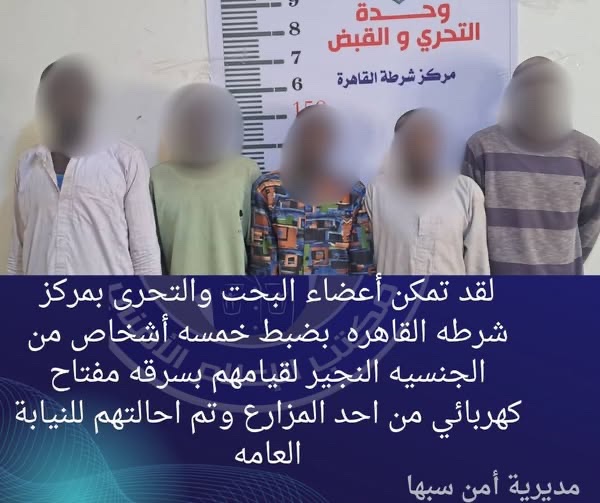In a significant development in Libya’s ongoing efforts to curb crime and protect local infrastructure, authorities in the southern city of Sabha have arrested five Nigerian nationals accused of stealing valuable electrical equipment from a local farm. The arrests, which took place on May 25, 2025, were carried out by the Al-Qahira Police Department, marking a swift response to a crime that has raised concerns about agricultural security in the region. The suspects have been referred to public prosecution for further investigation and legal proceedings, according to a statement from Migrant Rescue Watch, a regional monitoring group.
The incident occurred in Sabha, a key city in Libya’s Fezzan region, known for its agricultural activity despite the challenges posed by the country’s arid climate and ongoing socio-political instability. The stolen equipment, which includes critical electrical components essential for powering irrigation systems and other farm operations, represents a significant loss for the affected farm. Local authorities have not disclosed the exact value of the stolen items, but such equipment is vital for sustaining agricultural productivity in a region where resources are scarce.
According to preliminary reports, the Al-Qahira Police Department acted on a tip-off from local residents who noticed suspicious activity near the farm. Officers moved quickly to apprehend the suspects, who were allegedly caught in the act of dismantling and removing the equipment. The arrests highlight the increasing vigilance of local law enforcement in addressing property crimes, particularly those impacting Libya’s agricultural sector, which remains a cornerstone of the local economy.
The five Nigerian nationals, whose identities have not yet been publicly disclosed, are now in custody as the investigation unfolds. Authorities are working to determine whether the suspects were acting independently or as part of a larger organized network involved in similar thefts. The case has drawn attention to the broader issue of crime in Libya’s southern regions, where economic hardship and limited job opportunities have sometimes fueled illicit activities.
Sabha, located approximately 650 kilometers south of Tripoli, has faced significant challenges in recent years, including security concerns stemming from Libya’s civil conflict and its strategic position as a hub for cross-border migration. The city’s proximity to borders with Chad, Niger, and Algeria makes it a focal point for both legitimate trade and illicit activities, including smuggling and theft. The agricultural sector, which relies heavily on modern equipment to maximize productivity in harsh environmental conditions, has become a target for criminals seeking to profit from stolen goods.
This incident also underscores the broader socio-economic dynamics in Libya, where foreign nationals, including migrant workers from sub-Saharan Africa, often find themselves navigating a complex and sometimes hostile environment. While many migrants contribute positively to the local economy, incidents like this can exacerbate tensions between communities and fuel negative stereotypes. Authorities have emphasized that the investigation will proceed fairly, focusing on evidence and due process.
The Al-Qahira Police Department’s swift action has been praised by local farmers, who have long called for stronger measures to protect their livelihoods. “This theft is not just about equipment; it’s about our ability to feed our families and keep our farms running,” said one local farmer, who requested anonymity due to safety concerns. “We hope this sends a message that such crimes won’t be tolerated.”
As the case moves to public prosecution, legal experts anticipate a thorough investigation to uncover any potential links to broader criminal networks. The outcome of the case could set a precedent for how similar incidents are handled in the future, particularly in Libya’s southern regions, where law enforcement resources are often stretched thin.
This arrest comes at a time when Libya is grappling with multiple challenges, including rebuilding its economy and ensuring stability in the wake of years of conflict. The protection of critical infrastructure, such as agricultural equipment, is seen as a key component of these efforts. For now, the people of Sabha and the wider Fezzan region await further developments in this case, hoping for justice and stronger safeguards to protect their way of life.
Join our Whatsapp channel to stay updated always!


